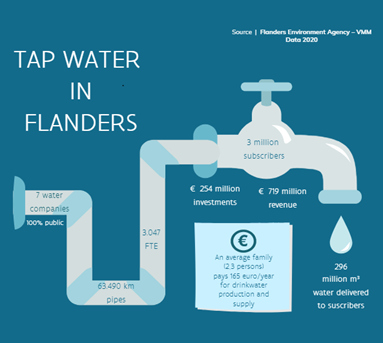Water Regulation Authority (Waterregulator)
Main responsibilities
The Regulation Authority performs the dedicated tasks assigned in the Water Code. Taking into account the available resources, the focus remains on regulation of the tap water tariffs, performance and efficiency comparison of the water companies and research to provide substantiated advice on economic aspects of the tap water supply in Flanders.
- Tariff regulation
Since 2016 the public water companies cannot apply a tariff-increase or introduce new tariffs for charging the costs for the production and supply of tap water to the subscribers without the prior consent of the Regulation Authority. The tariff regulation method is fixed in the Water Code and executive regulations. In a 6-year tariff plan, each water company estimates the reasonable resources necessary for performing the tap water activities. These costs are translated into the maximum rates charged to subscribers in the next 6 years. The tariff regulation method ensures an affordable, predictable and fair tap water price.
- Performance and efficiency comparison
Process benchmarking is imposed by the Water Regulator. One process is benchmarked each year. Following benchmarks have already been performed:- debtor management
- non-revenue water
- complaints management
- new branches
- asset management
- assessing measured water quality against evolving standards and knowledge
- generating and sending invoices
- operating supply lines and distribution networks.
After each benchmark, each water company creates an action plan in which the recommendations are translated into concrete actions and objectives. The action plan needs to be updated at least once a year.
3. Research and advice
The WaterRegulator conducts studies often in preparation of a spontaneous advice or a requested advice.

Regulated tap water industry in figures
More info in Dutch or contact waterregulator@vmm.be
Optimized tap water tariff regulation in Flanders



